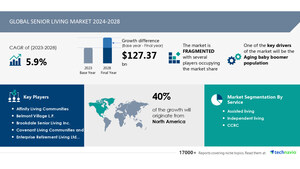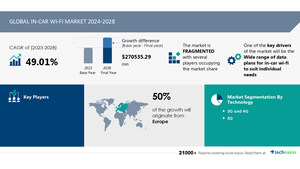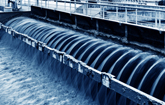NEW YORK, Oct. 28, 2024 /PRNewswire/ -- Report on how AI is driving market transformation - The global commercial fire sprinkler systems market size is estimated to grow by USD 2.05 billion from 2024-2028, according to Technavio. The market is estimated to grow at a CAGR of 8.2% during the forecast period. Government support with regard to fire sprinkler installation is driving market growth, with a trend towards growing mergers and acquisitions in global commercial fire sprinkler systems market. However, corrosion in commercial fire sprinkler systems poses a challenge.Key market players include ACCURO Brandschutzanlagen GmbH, API Group Corp., Cox Fire Protection Inc., Everon LLC., Fields Fire Protection, Fireline Corp., G.w. Sprinkler A S, Grundfos Holding AS, HD Fire Protect Pvt. Ltd., Honeywell International Inc., Johnson Controls International Plc., Minimax GmbH, NAFFCO FZCO, Polyteck Building Services Ltd, PTSG, Pye-Barker Fire and Safety LLC, Rosenbauer International AG, Siemens AG, The Reliable Automatic Sprinkler Co. Inc., and Victaulic Co..
AI-Powered Market Evolution Insights. Our comprehensive market report ready with the latest trends, growth opportunities, and strategic analysis- View your snapshot now
Forecast period |
2024-2028 |
Base Year |
2023 |
Historic Data |
2018 - 2022 |
Segment Covered |
Type (Wet pipe, Dry pipe, Pre action, Deluge, and Foam system), Class Type (Light hazard, Moderate hazard, High hazard, and Others), and Geography (North America, APAC, Europe, Middle East and Africa, and South America) |
Region Covered |
North America, APAC, Europe, Middle East and Africa, and South America |
Key companies profiled |
ACCURO Brandschutzanlagen GmbH, API Group Corp., Cox Fire Protection Inc., Everon LLC., Fields Fire Protection, Fireline Corp., G.w. Sprinkler A S, Grundfos Holding AS, HD Fire Protect Pvt. Ltd., Honeywell International Inc., Johnson Controls International Plc., Minimax GmbH, NAFFCO FZCO, Polyteck Building Services Ltd, PTSG, Pye-Barker Fire and Safety LLC, Rosenbauer International AG, Siemens AG, The Reliable Automatic Sprinkler Co. Inc., and Victaulic Co. |
Key Market Trends Fueling Growth
Major players in the commercial fire sprinkler systems market are expanding their market presence and enhancing their service offerings through strategic mergers and acquisitions. In January 2023, Johnson Controls International Plc. Acquired SimplexGrinnell for USD 5.1 billion, significantly strengthening its footprint in the Middle East, Africa, and other global markets. In May 2023, Pye-Barker Fire and Safety LLC acquired Automatic Fire Sprinklers, Inc., bolstering its fire sprinkler services on the West Coast. These acquisitions enable companies to leverage combined expertise, expand their geographic reach, and enhance their service offerings, contributing to the overall growth and advancement of the global commercial fire sprinkler systems market during the forecast period.
The Commercial Fire Sprinkler Systems market is witnessing significant growth due to the increasing focus on active fire protection in various sectors. Water supply systems, including pressure and flowrate, are crucial components of fire sprinklers, ensuring effective fire extinguishment. Water distribution piping and fire sprinklers work together to prevent fire damage and reduce insurance premiums. Automatic activation at temperature thresholds is a key feature, ensuring prompt fire suppression. Deluge and pre-action sprinkler systems cater to high hazard occupancies, while residential sprinkler systems protect homes. Fire safety regulations mandate fire safety directives for commercial and residential buildings, including healthcare facilities, retail stores, educational institutions, hotels, restaurants, data centers, and more. Fire safety regulations, fire protection engineers, and the Green Deal initiative promote energy-efficient buildings and climate-neutral fire suppression technology. Wet-pipe and dry-pipe sprinkler systems, along with gas-based suppression systems and smoke detection technologies, contribute to the fire protection market. Building codes ensure the implementation of advanced fire safety measures.
Insights on how AI is driving innovation, efficiency, and market growth- Request Sample!
Market Challenges
- Commercial fire sprinkler systems are essential for safeguarding businesses against fire-related risks. However, these systems face a significant challenge in the form of corrosion. Corrosion occurs when metal components react with environmental elements, leading to gradual degradation and impairments such as pinhole leaks or rust buildup. These impairments can severely impact system performance, reducing effectiveness in fire suppression and posing risks to life and property. Corrosion is often difficult to detect, making regular inspections and maintenance crucial. Discoloration, flaking, or unusual odors are early signs of corrosion. Despite preventative measures like corrosion-resistant materials, protective coatings, and advanced monitoring technologies, the industry continues to grapple with ensuring long-term durability and reliability in corrosive environments. The financial implications of corrosion are substantial. Costly repairs or replacements and associated downtime can disrupt business operations. The market for commercial fire sprinkler systems will face negative impacts due to the prevalence and financial consequences of corrosion during the forecast period.
- The Fire Sprinkler System market is facing challenges due to the increasing focus on green initiatives like the European Union's Green Deal and the need for climate-neutral, energy-efficient buildings. Fire safety remains a top priority, but traditional fire suppression systems, such as gas-based suppression systems, are being replaced with more sustainable, water-based solutions. Wet-pipe and dry-pipe sprinkler systems are popular choices, with water distribution patterns optimized for high efficiency. Building codes require safety measures during construction projects, leading to a demand for fire sprinkler services. Fire Protection Systems in commercial buildings are incorporating AI, smart sensors, panic buttons, motion sensors, and infrared surveillance for enhanced fire safety. Industrial verticals like Oil and Gas, Mining, Petrochemical, and Automation sectors also require advanced fire suppression technology. Property loss due to fire incidents drives infrastructure investment in fire safety regulations. Roof sprinkler systems and temperature-controlled environments are also gaining popularity. Insurance costs incentivize the adoption of smart buildings with advanced fire safety features.
Insights into how AI is reshaping industries and driving growth- Download a Sample Report
Segment Overview
This commercial fire sprinkler systems market report extensively covers market segmentation by
- Type
- 1.1 Wet pipe
- 1.2 Dry pipe
- 1.3 Pre action
- 1.4 Deluge
- 1.5 Foam system
- Class Type
- 2.1 Light hazard
- 2.2 Moderate hazard
- 2.3 High hazard
- 2.4 Others
- Geography
- 3.1 North America
- 3.2 APAC
- 3.3 Europe
- 3.4 Middle East and Africa
- 3.5 South America
1.1 Wet pipe- Wet pipe fire sprinkler systems are the most widely used commercial fire sprinkler systems due to their simplicity, reliability, and ease of maintenance. In these systems, pipes are permanently filled with water, ensuring an immediate response when a fire activates the sprinkler heads. This quick water discharge is essential for containing or extinguishing fires in non-residential settings. Wet pipe systems have fewer components compared to other types, reducing the likelihood of malfunctions and lowering maintenance costs. These benefits make wet pipe fire sprinkler systems a preferred choice for high-rise buildings and commercial establishments.
Download complimentary Sample Report to gain insights into AI's impact on market dynamics, emerging trends, and future opportunities- including forecast (2024-2028) and historic data (2018 - 2022)
Research Analysis
The Commercial Fire Sprinkler Systems market is experiencing significant growth due to the increasing focus on fire safety in Climate-neutral and Energy-efficient buildings under the Green Deal initiative. Fire-related incidents continue to cause extensive Property damage, making fire protection a priority for Commercial Buildings. Fire Sprinkler Systems are a crucial component of Active fire protection, providing early detection and suppression using Fire Suppression technology. Water distribution patterns, pressure and flowrate, and Water supply system design are essential considerations. Gas-based suppression systems and Smoke detection technologies, including AI and Smart Sensors, are also gaining popularity. Fire Protection Systems incorporate Panic Buttons, Motion Sensors, and Infrared Surveillance for enhanced safety. High-efficiency systems and advanced Water distribution piping are key to minimizing water waste. Fire sprinklers with Automatic activation are a critical element in preventing fires from spreading, ensuring Safety in Commercial Buildings. Infrastructure Investment continues to fuel market growth.
Market Research Overview
The Commercial Fire Sprinkler Systems market is witnessing significant growth due to the increasing focus on fire safety in buildings, especially with the implementation of Green Deal initiative and the push towards energy-efficient and climate-neutral structures. Fire sprinkler systems play a crucial role in fire protection, preventing property damage and saving lives during fire-related incidents. Fire suppression technology encompasses various systems like wet-pipe and dry-pipe, each with unique water distribution patterns and activation mechanisms. Building codes mandate safety measures during construction projects, and fire sprinkler services ensure proper installation and maintenance. Advancements in fire protection systems include gas-based suppression systems, smoke detection technologies, and automation. AI, smart sensors, and other technologies are being integrated into fire protection systems for high efficiency and cost savings. Industrial verticals such as Oil and Gas, Mining, Petrochemical, and Automation industries require fire protection systems due to high hazard occupancies. Insurance costs are influenced by fire safety regulations, and commercial and industrial buildings, residential buildings, healthcare facilities, retail stores, educational institutions, hotels and restaurants, data centers, and other high hazard occupancy buildings all benefit from advanced fire safety systems. Fire safety regulations and fire protection engineers are essential in ensuring fire safety directives are met, and various fire sprinkler systems such as deluge, pre-action, and residential sprinkler systems cater to different occupancy types and temperature-controlled environments. Active fire protection systems, water supply systems, pressure and flowrate, water distribution piping, and fire sprinklers are all integral components of a comprehensive fire protection system. Fire extinguishment and damage prevention are key objectives, with automatic activation, temperature threshold, and fire extinguishment capabilities all contributing to effective fire suppression.
Table of Contents:
1 Executive Summary
2 Market Landscape
3 Market Sizing
4 Historic Market Size
5 Five Forces Analysis
6 Market Segmentation
- Type
- Wet Pipe
- Dry Pipe
- Pre Action
- Deluge
- Foam System
- Class Type
- Light Hazard
- Moderate Hazard
- High Hazard
- Others
- Geography
- North America
- APAC
- Europe
- Middle East And Africa
- South America
7 Customer Landscape
8 Geographic Landscape
9 Drivers, Challenges, and Trends
10 Company Landscape
11 Company Analysis
12 Appendix
About Technavio
Technavio is a leading global technology research and advisory company. Their research and analysis focuses on emerging market trends and provides actionable insights to help businesses identify market opportunities and develop effective strategies to optimize their market positions.
With over 500 specialized analysts, Technavio's report library consists of more than 17,000 reports and counting, covering 800 technologies, spanning across 50 countries. Their client base consists of enterprises of all sizes, including more than 100 Fortune 500 companies. This growing client base relies on Technavio's comprehensive coverage, extensive research, and actionable market insights to identify opportunities in existing and potential markets and assess their competitive positions within changing market scenarios.
Contacts
Technavio Research
Jesse Maida
Media & Marketing Executive
US: +1 844 364 1100
UK: +44 203 893 3200
Email: [email protected]
Website: www.technavio.com/
SOURCE Technavio

WANT YOUR COMPANY'S NEWS FEATURED ON PRNEWSWIRE.COM?
Newsrooms &
Influencers
Digital Media
Outlets
Journalists
Opted In





Share this article